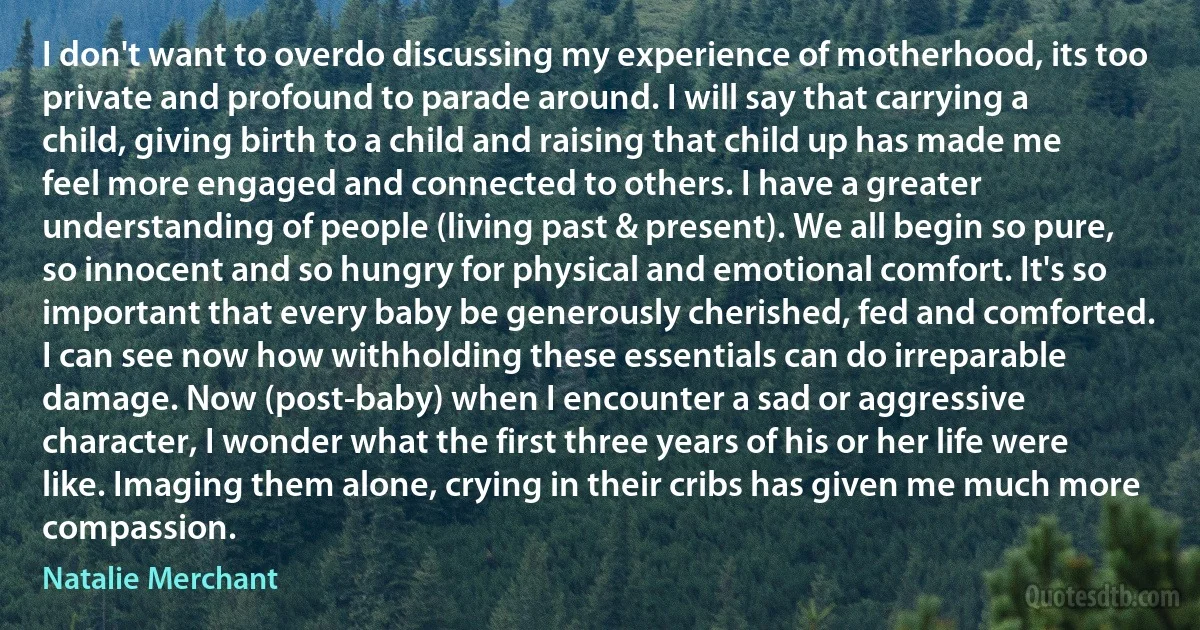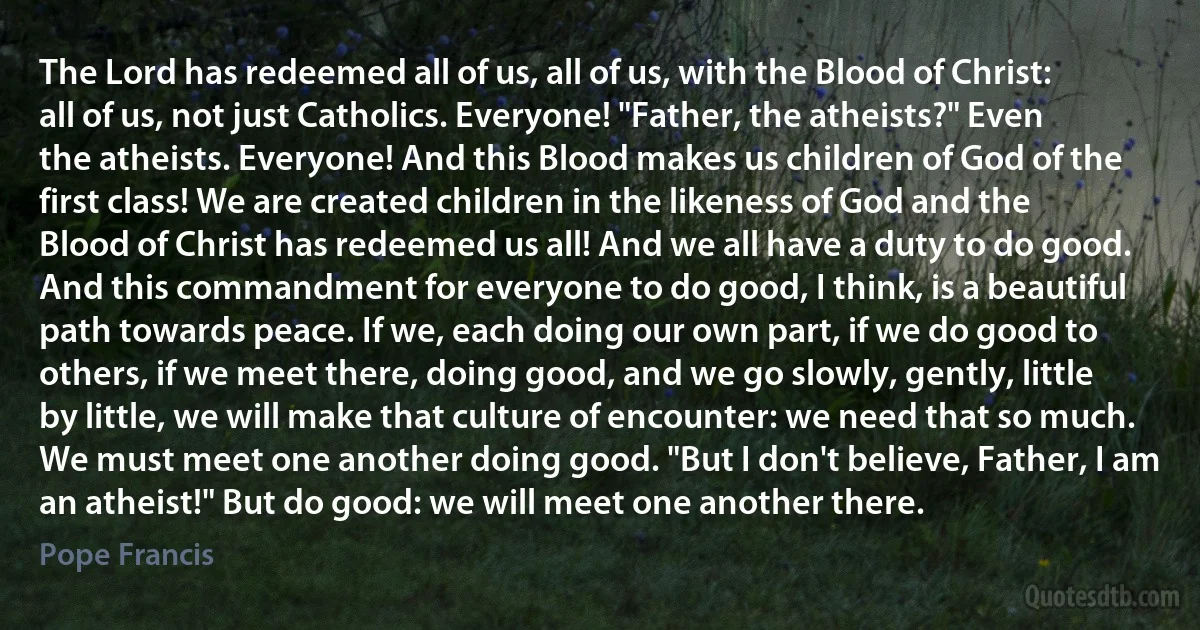Encounter Quotes - page 16
While I was working on Downward Spiral, I was living in the house where Sharon Tate was killed. Then one day I met her sister. It was a random thing, just a brief encounter. And she said: "Are you exploiting my sister's death by living in her house?" For the first time, the whole thing kind of slapped me in the face. I said, "No, it's just sort of my own interest in American folklore. I'm in this place where a weird part of history occurred." I guess it never really struck me before, but it did then. She lost her sister from a senseless, ignorant situation that I don't want to support. When she was talking to me, I realized for the first time, "What if it was my sister?" I thought, "Fuck Charlie Manson." I went home and cried that night. It made me see there's another side to things, you know?

Trent Reznor
In some sense it is my story, too. I grew up and read and became a historian and, I like to think, an intellectual. The Jewish question was never at the center of my own intellectual life, or indeed my historical work. But it intrudes, inevitably, and with ever greater force. One of the aims of this book is to allow such themes to encounter each other, to permit the intellectual history of the twentieth century to meet the history of the Jews. This is a personal as well as a scholarly effort: after all, many of us who have, in our work, kept these themes distinct are ourselves Jews.

Tony Judt
In conclusion, may I repeat that stigma involves not so much a set of concrete individuals who can be separated into two piles, the stigmatized and the normal, as a pervasive two-role social process in which every individual participates in both roles, at least in some connexions and in some phases of life. The normal and the stigmatized are not persons but rather perspectives. These are generated in social situations during mixed contacts by virtue of the unrealized norms that are likely to play upon the encounter. [...] And since interaction roles are involved, not concrete individuals, it should come as no surprise that in many cases he who is stigmatized in one regard nicely exhibits all the normal prejudices held toward those who are stigmatized in another regard.

Erving Goffman
[When Leibniz and Spinoza met in The Hague in 1676] The encounter between the two greatest philosophers of the seventeenth century in fact extended over several days. From a letter Leibniz posted to the Duke of Hanover's secretary from Holland, it is possible to infer that the courtier arrived in The Hague on or before November 18 and remained for at least three days and possibly as much as one week. Leibniz later told his Parisian friend Gallois that he had conversed with Spinoza "many times and at great length".

Baruch Spinoza
Periods of history when values undergo a fundamental shift are certainly not unprecedented. This happened in the Hellenistic period, when from the ruins of the classical world the Middle Ages were gradually born. It happened during the Renaissance, which opened the way to the modern era. The distinguishing features of such transitional periods are a mixing and blending of cultures and a plurality or parallelism of intellectual and spiritual worlds. These are periods when all consistent value systems collapse, when cultures distant in time and space are discovered or rediscovered. They are periods when there is a tendency to quote, to imitate, and to amplify, rather than to state with authority or integrate. New meaning is gradually born from the encounter, or the intersection, of many different elements.

Václav Havel
We do not hold the belief that this earth is a realm of misery where man is doomed to destruction. We do not think that tragedy is our natural fate and we do not live in chronic dread of disaster. We do not expect disaster until we have specific reason to expect it-and when we encounter it, we are free to fight it. It is not happiness, but suffering that we consider unnatural. It is not success, but calamity that we regard as the abnormal exception in human life.

John Galt
Google Translate: From here I am going to meet with 60 foreign ministers and representatives of countries around the world against Iran. What is important is the encounter, and a meeting not secretly or secretly, because there are many. This is in fact an open meeting with representatives of leading Arab countries that sit with Israel to advance the common interest of a war in Iran.

Benjamin Netanyahu
We have heard a great deal of our Pilgrim Fathers...but who has heard of the Pilgrim Mothers? Did they not endure as many perils, encounter as many hardships, and do as much to form and fashion the institutions of New England as the Pilgrim Fathers? And were not their trials, and is not their glory equally great? Yet they are hardly remembered.

Ernestine Rose
Having lived all my life in a country swarming with messiahs, I have been mistaken, perhaps quite naturally, for one myself, especially by the others. It would be hard to imagine anything more preposterous. I am, in fact, the complete anti-Messiah, and detest converts almost as much as I detest missionaries. My writings, such as they are, have had only one purpose: to attain for H. L. Mencken that feeling of tension relieved and function achieved which a cow enjoys on giving milk. Further than that, I have had no interest in the matter whatsoever. It has never given me any satisfaction to encounter one who said my notions had pleased him. My preference has always been for people with notions of their own. I have believed all my life in free thought and free speech-up to and including the utmost limits of the endurable.

H. L. Mencken
This Extraordinary Holy Year is itself a gift of grace. To pass through the Holy Door means to rediscover the infinite mercy of the Father who welcomes everyone and goes out personally to encounter each of them. This will be a year in which we grow ever more convinced of God's mercy. How much wrong we do to God and his grace when we speak of sins being punished by his judgment before we speak of their being forgiven by his mercy! But that is the truth. We have to put mercy before judgment, and in any event God's judgement will always be in the light of his mercy. In passing through the Holy Door, then, may we feel that we ourselves are part of this mystery of love. Let us set aside all fear and dread, for these do not befit men and women who are loved. Instead, let us experience the joy of encountering that grace which transforms all things.

Pope Francis
'I'm sorry,' he said. 'You're Commander Poole, of course. But I'm sure we've never met before.'...He was glad of the encounter, and was pleased to know that Danil was back in normal society. Whether his original crime had been axe-murders or overdue library books should no longer be the concern of his one-time employer; the account had been settled, the books closed.

Arthur C. Clarke
When you encounter those who are wicked, unrighteous, foolish, dim-witted, deformed, vicious, chronically ill, lonely, unfortunate, or disabled, you should think: "How can I save them?” And even if there is nothing you can do, at least you must not indulge in feelings of arrogance, superiority, derision, scorn, or abhorrence, but should immediately manifest sympathy and compassion. If you fail to do so, you should feel ashamed and deeply reproach yourself: "How far I have strayed from the Way! How can I betray the old sages? I take these words as an admonition to myself.”.

Ryōkan
I think so often how people, particularly poets, begin first writing out of heartbreak, out of loss. Like I think most people's early poems are because they are so emotional over something and this is the only form that feels safe, I can get it out on paper, at least that is how I remember writing and when I often encounter a young poet it is because of a thing that they are almost trying to exercise out of themselves and writing is the way to turn... and that does feel like creating from crisis.

Elizabeth Acevedo
To pray means to open your hands before God. It means slowly relaxing the tension which squeezes your hands together and accepting your existence with an increasing readiness, not as a possession to defend, but as a gift to receive. Above all, prayer is a way of life which allows you to find a stillness in the midst of the world where you open your hands to God's promises and find hope for yourself, your neighbor and your world. In prayer, you encounter God not only in the small voice and the soft breeze, but also in the midst of the turmoil of the world, in the distress and joy of your neighbor and in the loneliness of your own heart.

Henri Nouwen
Those of us who travel overseas, especially to war zones and other troubled areas around the globe, encounter members of U.S. based media who risk their lives, and sometimes lose their lives, reporting on the truth. To dismiss their work as fake news is an affront to their commitment and their sacrifice.
According to the International Federation of Journalists, 80 journalists were killed in 2017, and a new report from the Committee to Protect Journalists documents that the number of journalists imprisoned around the world has reached 262, which is a new record. This total includes 21 reporters who are being held on "false news" charges.

Jeff Flake
During that year in Aarau the question came to me: If one runs after a light wave with [a velocity equal to the] light velocity, then one would encounter a time-independent wavefield. However, something like that does not seem to exist! This was the first juvenile thought experiment which has to do with the special theory of relativity. Invention is not the product of logical thought, even though the final product is tied to a logical structure.

Albert Einstein


